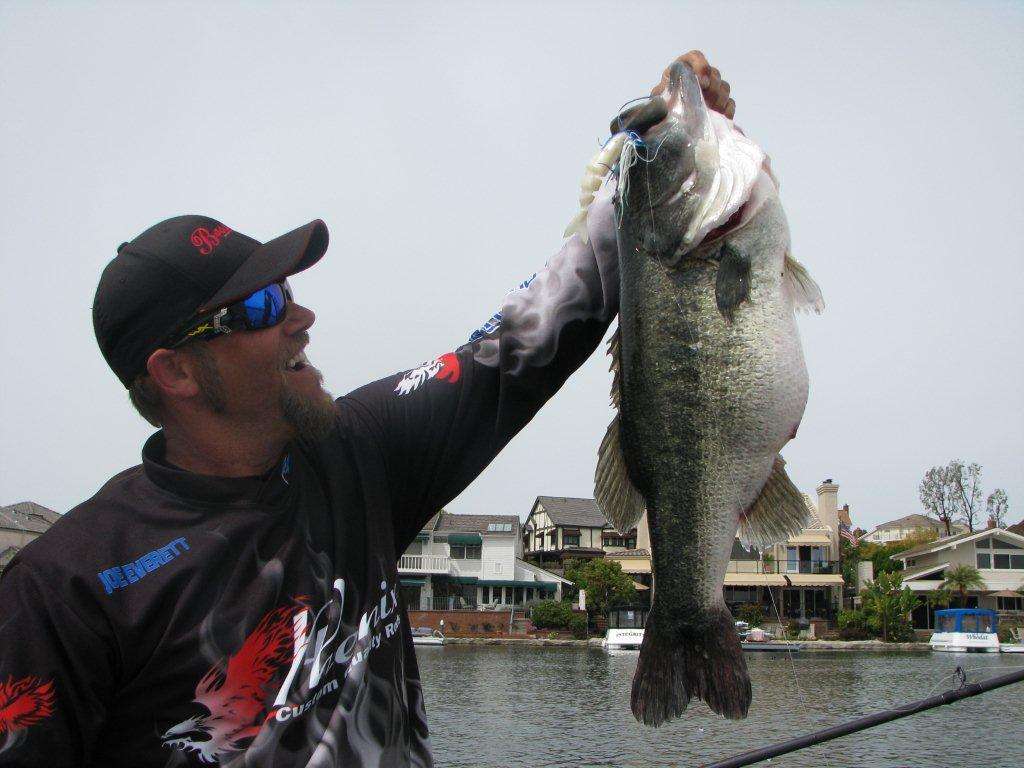
Joe Everett is a man on a mission. The Southern California angler is a trophy hunter — one of a legion of anglers trying, hoping, wishing to catch the next world record largemouth bass. Along his way to that goal, Everett has caught so many 10-pound, 12-pound and even 15-pound bass that he no longer counts or targets them. After all, they're not the fish he's after.
As a man who's caught hundreds of bass that others would call their bass of a lifetime, Everett has become extremely proficient with his trophy hunting. His insights will help us all in the quest to catch a bigger bass than ever before.
His tips are straightforward, concise and unfailingly helpful.
1. Fish where the giants live.
"Whether you're after a world record largemouth or a six-pound smallmouth, you'll never catch one unless you're fishing where they live," Everett says. "I do most of my largemouth fishing at Lake Mission Viejo, because that's where I think I can catch a world record. But if I lived in Connecticut or Colorado, I'd study the waters there and go to the places that give me the best shot at catching the biggest fish around."
There are multiple ways to find the best trophy waters in your area, but three of the best are local outdoor publications, tackle retailers and your state fish and game agency. The publications likely publish photos or lists of big bass catches in your area. Tally them and figure out where to try. Local tackle emporiums probably have a bragging board full of photos of hefty fish. Pay attention to where they were taken.
But your most reliable source is going to be your state fish and game department. Contact the local office and ask about your best bet for the bass of a lifetime. They probably have electro-fishing or other data showing where the big ones live and can even tell you which trophy waters are underutilized, improving your chances of a big catch even more.
2. Timing is everything.
It's not always enough to be in the right place. You also need to be there at the right time. Every one of the bass on the Bassmaster Top 25 largemouth list was taken between January and July 2, and most of them were caught in the prespawn season.
"For my goal of catching the next world record," Everett says, "I have about a 45-day window in the prespawn when that fish is going to be most available to me and most vulnerable to my methods. That's when I have my best chance. It's not likely to happen in the summer or fall, and that's true for most bass fishing all over the world. The biggest bass are caught in the late winter and early spring. They're heaviest then, too, because they have added weight from eggs before the spawn."
Trophy anglers all over attest to the fact that the biggest bass spawn first. Be there to meet them if local fishing seasons permit. Everett has tremendous respect for bass and the sport and realizes that bed fishing is controversial in many circles. He also realizes that bed fishing gives him the best chance of realizing his goal — catching and later releasing a world record.
3. Spend lots of time on the water.
Tied closely to number 2 is the need to spend as much time on the water as you possibly can during the peak times. For Everett, a surfboard maker by trade with PureGlass, it means taking all his vacation time in that productive window of opportunity or working nights so he can fish during the day.
"Here in Southern California where trophy fishing can be so competitive, it's critical that I get out there early and be prepared to stay all day long if the opportunity presents itself," he says. "You never know when you're going to find the bass you're looking for, but it's a sure bet that it's going to take some time and dedication to find and catch her. The best way to do it is to spend a lot of time on the water."
Much of the spawn is tied to lunar cycles. Lots of trophy anglers focus their fishing around full and new moons. Check your calendar.
4. Use the best equipment.
When you finally get the opportunity you've been waiting your whole fishing life for, don't blow it by using inferior equipment.
"A really big bass will put your gear to the test," Everett says. "Don't go to a gunfight with a butter knife. Get the best stuff you can afford and know how to use it. Everything needs to be just right — your rod, reel and line, your hook-set and knot, your lure and hooks. If it's not just right, the bass is going to find that weak link and break your heart."
Everett uses and believes in Ardent reels, his signature series Phenix rod (a 7-foot, 3-inch extra-heavy model with a fast action), 20-pound-test Maxima monofilament line (he likes mono for reasons we'll cover in a later installment), Phenix Pro Line jigs, Uncle Josh pork rind and the Lake Fork Tackle Magic Shad for most of his record hunting.
Get the best gear you can find and put it together to create a system that works for you. Streamline your gear and approach. Get rid of the chaff and get ready to catch the bass of a lifetime.
Originally published March 2011





